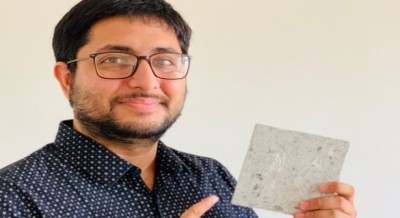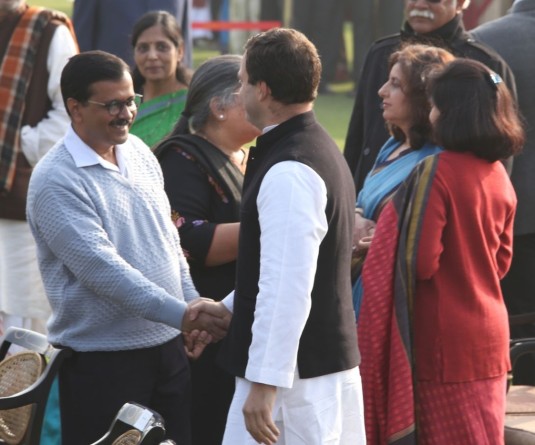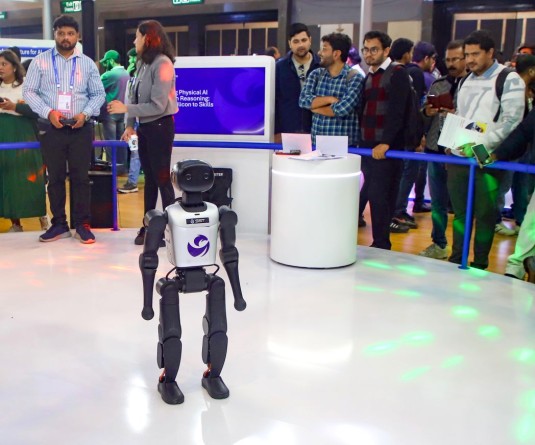Image Source: IANS News

New Delhi, June 4 (IANSlife) With an unprecedented global need for masks and protective gear, came the challenge of complex waste. 27-year-old Binish Desai, who hails from the small district of Valsad in Gujarat, is an environmentalist and waste warrior who is creating eco-friendly bricks out of PPE kits and masks made from non-woven fabric to help decrease the burden on the environment.
A Rotarian, Desai follows a procedure that successfully manages this new kind of waste and puts it to a sustainable use: "After following proper sanitation protocols, the material is shredded, added to industrial paper waste procured from paper mills, and then mixed with binder. The mix is kept for 5-6 hours before being set in moulds. The bricks are naturally dried for three days and the product is then ready for use."
The innovator and sustainability champion is also the Chairman of Recycling, Rotary International's ESRAG (Environmental Sustainability Rotarian Action Group) in South Asia.
Desai speaks to IANSlife for World Environment Day 2021:
Q: What got you interested in recycling and waste management? How did you enter the space?
A: Just like any other child, I used to revel in outdoor games, cartoons, and comics. However, at the age of 10, my favourite pastime was watching Captain Planet -- a superhero trying to defend Earth from pollution caused by villains and Dexter's Laboratory -- an animated series about a boy who ran a secret science lab at home. The show generated curiosity and inspired me to think innovatively.
In 2009, I got selected as a Rotary Youth Exchange student and that played an integral role in shaping my personality and channelising my thought process towards contributing to society at large. I informed my host family during the exchange and fellow Rotary members about my plans to build the world's least expensive house using chewing gum and wastepaper, and finally found a receptive audience I had been seeking.
Q: Tell us about your efforts in and process of recycling used PPE kits, masks, and other protective equipment. Is there a fear that they might contain the virus? How safe is the end product?
A: As the pandemic peaked, there was significant increase in the unsafe disposal of masks and PPE kits in water bodies, which emerged as a new threat to the environment. According to industry reports, at least 129 billion face masks are being used and discarded every month. The crisis doesn't just stop there, the manufacturers of PPE are also facing issues with the disposal of the PPE waste that is produced during the manufacturing process.
The solution to this problem was converting the waste into special formulated bricks which can be used for all types of building construction and boundary walls. We collected discarded PPE from the public at commercial establishments, shopping malls, institutions, offices, etc and stored in a separate bin for three days.
Safety and hygiene are paramount when dealing with medical waste which is why we follow all Central Pollution Control Board guidelines. As PPE waste must be kept untouched for 72 hours before disposal, the eco-bins are opened 72 hours later, and the waste is then washed in a pool of disinfectant. After following proper sanitation protocols, the material can be shredded, added to industrial paper waste procured from paper mills, and then mixed with a binder. The mix is kept for 5-6 hours before being set in moulds. The bricks are naturally dried for three days and the product is then ready for use.
In 2010, I had designed P-Block (bricks from chewing gum leftovers and industrial paper). Using a similar process, I developed Brick 2.0 using "corona waste". I added PPE made from non-woven fabric which includes masks, gowns, syringes, and head-covers. I started experimenting with the method in my home-lab, and soon made a few in my factory. Face masks are a part of the new normal and they are adding to the plastic pollution. The idea was to manage the waste by the way of recycling and utilise it for something better. We have used three things -- masks, head cover and certain types of bodysuits of PPE which are made from non-woven fabric.
Q: Where is this recycled material used? Where have you found these bricks at home?
A: We have been using these bricks to create cost-effective toilets, refabricated houses, apartments, and even eco-centres and eco-schools. There is also a museum being made which will have these bricks made from PPE waste and paper. We have recently started creating furniture as well and have worked with 106 different types of waste (jewellery units, textile scraps, paper surplus, coffee waste, etc.) to create over 180 products such as wall and acoustic panels, paver blocks, home decor artefacts, and more.
Q: What are your thoughts on waste management in India? Is enough being done? What are some key hits and misses of the current practice?
A: Waste management in India is lesser known among people but Green India Mission has shed more light on the importance of sustainability. Organisations like Rotary have been trying to make a difference in this area by supporting initiatives at a grassroot level that could have a long-term, positive impact on the environment. Currently, India is the 6th largest producer of waste and we have around 43,000 industries generating 19,000 tonnes of waste every day. Approximately, 10,000 cars are being sent to the landfills daily.
Traditionally, Indians have been using the 'reduce, recycle and reuse' approach in their everyday life much before it became one of the most successful approaches in making a positive impact on the environment. We see at home how mothers make use of old clothes and have been playing the role of biggest recyclers. Also, it is imperative to understand that waste management is not only segregation or relocation of waste but also about getting rid of the waste in a sustainable manner.
We need to find eco-economic and social ideas that can be implemented on a large scale. For this, the government must set regulations creating a circular economy, manufacturers need to be more cautious about what they are using and how they can reduce their consumption of non-recyclable materials or recycle more waste that they are generating. Consumers also should take an extra step to reuse and recycle material or ask the right questions to management or government to reduce waste. Recyclers should understand how to create products that are environmentally friendly and socially impactful but are also economically viable, only then the consumers will be able to utilise it to the maximum. All the stakeholders involved in this cycle need to work together so that one man's waste becomes another man's treasure.
Q: There are worrying studies and visuals on plastics and micro-plastics being found in oceans, marine life, soil, and even agricultural produce. How do you view these harmful developments?
A: As technology evolved and materials became complex, waste came into existence. Nature is also taking longer to break down these materials and that is resulting in the generation of waste in oceans and soil. Microplastics found in the ocean are worrisome and raise an alarm for us to opt for products that are less toxic to nature. It is recommended to adopt a zero-waste lifestyle and move towards eco-friendly products. Reusing and reducing is a common phenomenon that should become a way of life to utilise resources in the right way.
Q: How can we take this message of sustainability far and wide, especially in the age of consumerism?
A: In this age of mass consumption, we have forgotten the essence of going local and buying handmade products which are eco-friendly. We are also drawn towards buying things that we want and not just what we need. Minimalism is a way to move forward to produce lesser waste. Recycling as much as possible and segregating waste products to create something useful has become necessary. People can also reach out to their nearest Rotary club who will help in creating more sustainable solutions for the locality. The way to move forward is 'Paryavaran Sthir Atmanirbharta' which means environmentally cautious and sustainable self-reliance.






